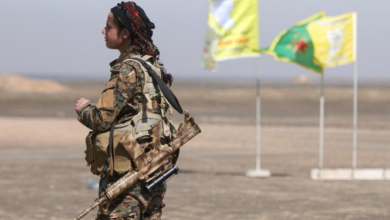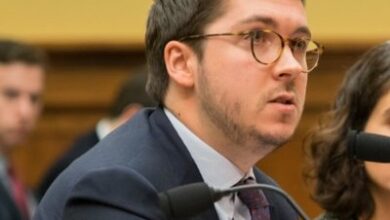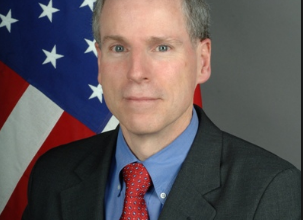
‘Mother Syria’ is lost amid ISIS’s modern-day colony
As the Arab world marks Mother’s Day today, Syria’s historical legacy must be remembered.
Nestled within the ancient Mesopotamia region, “Mother Syria” was the cradle of early civilization. It was the birthplace of urban cultures that expanded through time.
Notably, a prosperous urban center named Hamoukar grew out of Northeastern Syria and by 4500 B.C. it had become a large city. Alongside its presence on numerous trade routes, many archaic cities arose in ancient Syria by virtue of its demographical location being at the “crossroads of many great civilizations.”
Tracing history as far back as 2000 B.C.E., amongst the dwellers of Syria have been the Canaanites, the Phoenician traders of Lebanon, the Arameans of Syria, the Egyptians, the Babylonians, the Hittites of Turkey and the Sumerians and Assyrians of Iraq. Alongside a major prominence in history books, Syria is also steeped in religious scriptures and is home to Maaloula, a “unique linguistic” historical village where ‘Aramaic’, the language of Jesus Christ, is still spoken in modern times.
Syria’s capital city Damascus was founded in the 3rd millennium B.C. and has shown signs of inhabitation from as early as 8,000 to 10,000 BC. Today, Damascus is the oldest capital city in the world.
Syria’s ancient history documents the rise and achievements of monumental scholars including: Ignatius (Church Father and third Bishop of Antioch), Theodoret of Cyrrhus (who wrote 300 volumes on the art of medicine), Syrian Christian theologian and poet Ibn al-Nafis, profound historian Abhdisho bar Berikha, Ismail ibn Kathir who wrote an explanatory account on the Quran and earnest astronomer Ibn al-Shatir who was the founder of the new planetary theory that was later reproduced and adopted by Polish astronomer, Nicolaus Copernicus.
Torn and divided
Today, Mother Syria has regressed from being the bassinet of enlightenment and historical civilization into a torn and divided society. The four-year political turmoil and divisions between its children have turned Syria into a vulnerable prey for the territorial and ideological invasion of extremism. From a self-proclaimed podium of superiority, ISIS’ territorial proliferation on Syrian soil exhibits a new colonial concept. To them, the “insider vs. outsider” balance of power is tipped in favor of the more fanatic, the more ruthless and the more brutal.
ISIS, along with the political and militarized conflicts, has restructured Syria into a modern dystopia with a cataclysmic decline in the state structure.
Dr. Halla Diyab
The invader, ISIS, has been reconstructing all facets of life in Mother Syria by stripping it of its diverse mosaic minority inhabitants. With atrocities committed against Syrian Christians, the kidnapping of Christian Assyrians in northeastern Syria, the demolition of Syria’s cultural heritage, the bombing of churches and monuments and the destruction of historical sites (ISIS lately defaced Syria’s Armenian genocide memorial church), the terrorists are pushing Syria into a dark abyss of dehumanization, oppression, illiteracy and invisibility.
ISIS, along with the political and militarized conflicts, has restructured Syria into a modern dystopia with a cataclysmic decline in the state structure. The narrative and the actions of the powerful ISIS and the images of powerless Syrian victims have replaced profound Syrian history with the distorted polemic violence of ISIS, the invader.
The colonization of Syria has stripped its earthly and maternal features of fertility, life, diversity, and generosity in order to reconstruct it as a space open to radicalization by ISIS. This reconstruction operates on the introduction of three tools of invasion, the first being s demographical change of a territory. In the case of Syria, part of this demographical change is achieved by dividing it into small states, ‘Islamic emarah,’ rebranding the name of the country into “Islamic State,” renaming institutions and streets with personified anonymous Islamic names, painting buildings black, erasing geographical borders to “re-create a medieval-style caliphate,” and replacing the Syrian national flag with the flag of ISIS.
The second tool operates on identity reproduction. In Syria, along with new colonies, a new hierarchy is being built which establishes the ranking of the foreign jihadists as higher than local Syrian inhabitants in civil rights and privileges (including free houses, utilities, cars, and better treatment).
Placing the foreign jihadists in positions of privilege over the local Syrians will soon create more tension and aid the jihadists in establishing their new identity to be more powerful than the original identity of “Syrianism.” Use of this tactic may result in locals either being forced to submit to the invaders or having to choose between punishment and fleeing. The third tool is a cultural/historical tactic that operates on replacing diverse and progressive Syrian culture with primitive radicalism and extremism.
Historically resilient legacy
ISIS’ colonial occupation of Syria is challenged by the resistant and prominent demography of the country. Located on the north bank of the Euphrates River, only 40 kilometers east of Syria’s largest Dam (Tabqa Dam), Raqqa, which is today one of ISIS’ strongholds. In contrast to ISIS’ atrocities against local Syrians in Raqqa, demographically, the city still offers a panoramic portrayal of motherliness for Syrians. It remains to be a place which symbolizes selflessness, fertility and life. Through implementing early marriage, kidnapping, forced marriages, slavery and the trafficking of women, ISIS attempts to regress the motherly nature of the city.
The brash political conflict which divided and destroyed Syria at the hands of its own children, is drawing ties between the invader and the colonized cities that only remind Syria of its once historically resilient legacy.
_____________
Dr. Halla Diyab is an award winning screen-writer, producer, broadcaster, a published author and an activist. She has a Ph.D. in English and American Studies from the University of Leicester. She carried out research in New Orleans, USA while working on her thesis “The Examination of Marginality and Minorities in the Drama and Film of Tennessee Wil-liams”. She holds an MA in Gender and Women Studies from the University of Warwick. She has written a number of scripts for TV dramas countering religious extremism and international terrorism resulting in her being awarded Best Syrian Drama Script Award 2010 and the Artists Achievement Award 2011. She is a regular commentator in the Brit-ish and international media and has recently appeared on Channel 4 News, BBC Newsnight, BBC This Week, CNN, Sky News, Channel 5 News, ITV Central, Al Jazeera English, and BBC Radio 4, to name a few. She is a public speaker who spoke at the House of Commons, the Spectator Debate, Uniting for Peace and London’s Frontline Club. She has worked in Libya, Egypt, Saudi Arabia, Bahrain, and Syria and is an expert on the Middle East and Islamic culture. As a highly successful drama writer, she has been dubbed ‘one of the most influential women in Syria’ in 2011. She also produces documentary films for UK and international channels. She is also the Founder & Director of Liberty Media Productions which focuses on cross-cultural issues between Britain and the Middle East. She can be found on Twitter: @drhalladiyab
alarabiya.net



